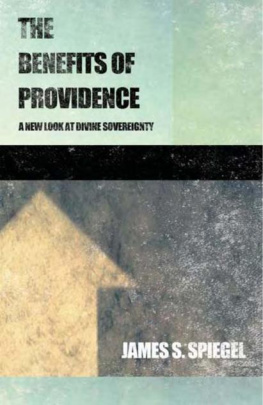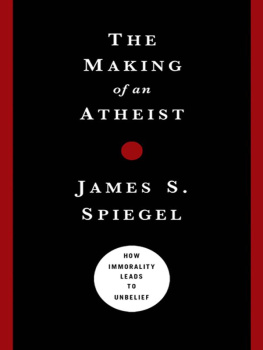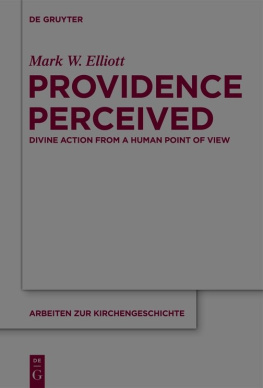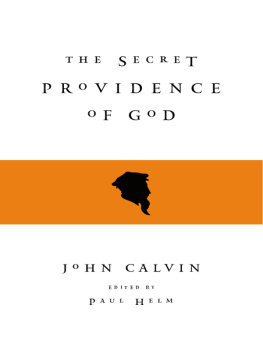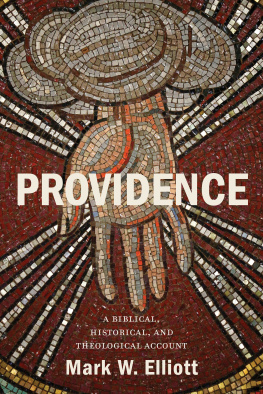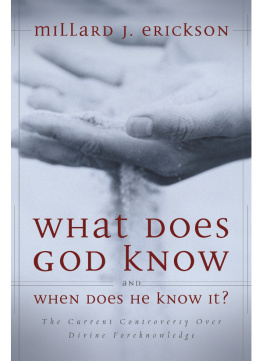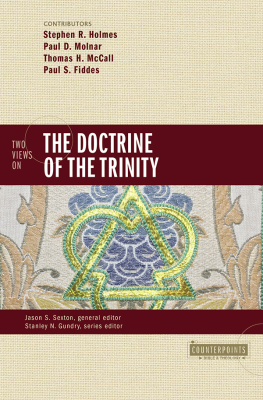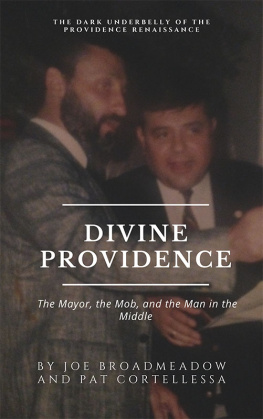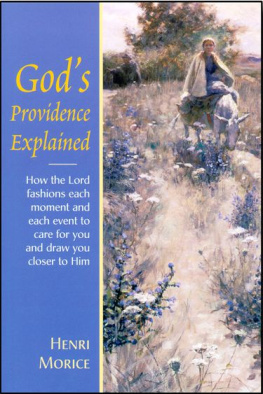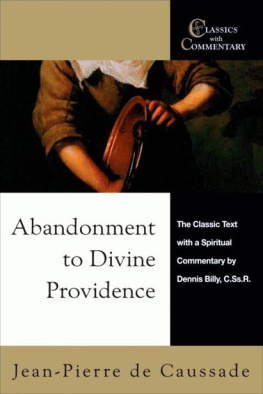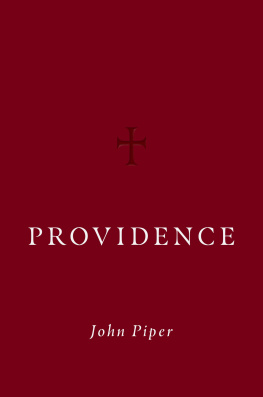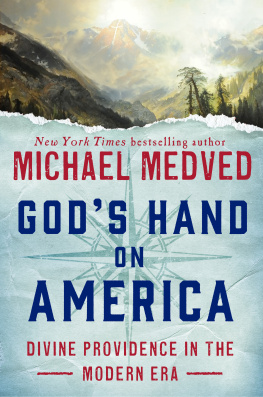THE BENEFITS OF PROVIDENCE
THE BENEFITS OF PROVIDENCE
A NEW LOOK AT DIVINE SOVEREIGNTY

JAMES S. SPIEGEL
CROSSWAY BOOKS
A PUBLISHING MINISTRY OF GOOD NEWS PUBLISHERS WHEATON, ILLINOIS
The Benefits of Providence
Copyright 2005 by James S. Spiegel
Published by Crossway Books
A publishing ministry of Good News Publishers
1300 Crescent Street
Wheaton, Illinois 60187
All rights reserved. No part of this publication may be reproduced, stored in a retrieval system or transmitted in any form by any means, electronic, mechanical, photocopy, recording or otherwise, without the prior permission of the publisher, except as provided by USA copyright law.
Cover design: Josh Dennis
First printing, 2005
Printed in the United States of America
All Scripture quotations, unless otherwise indicated, are taken from the Holy Bible: New International Version . Copyright 1973, 1978, 1984 by International Bible Society. Used by permission of Zondervan Publishing House. All rights reserved.
The NIV and New International Version trademarks are registered in the United States Patent and Trademark Office by International Bible Society. Use of either trademark requires the permission of International Bible Society. FOR
BAILEY, SAMUEL, AND MAGDALENE
CONTENTS

We do not want merely to see beauty, though, God knows, even that is bounty enough. We want something else which can hardly be put into wordsto be united with the beauty we see, to pass into it, to receive it into ourselves, to bathe in it, to become part of it.
C. S. L EWIS ,
T HE W EIGHT OF G LORY
PREFACE

For as long as I can remember I have sensed the presence of God. From the time I was a toddler, listening to my mother tell me about God, I recognized that the world is rich with manifestations of the divine. Even as a rebellious teenager, wishing that I could be a law unto myself, I could not shake this feeling. As I have matured, this sense of Gods presence has grown more acute, even as it flowered into what I regard as a personal acquaintance with God, along with a full-fledged theology of his attributes and works. Today my sense is no longer merely that God is here with me, but that he is everywhere, within and without, sustaining all things, that he guides every event in human history, and that he is coordinating all aspects of the cosmos toward a glorious end. I believe that Gods work in the world is thoroughly intimate and redemptive. In short, I confess, with the great Christian minds Augustine, Anselm, Aquinas, Luther, Calvin, and Edwards, that God is entirely sovereign and perfectly good, the holy and omnipotent Lord of all. And I confess with the apostle Paul, along with the Stoic poet whom he quotes, that in God we live and move and have our being (Acts 17:28).
For centuries Christians have affirmed the sovereignty of God. But recent generations have seen a falloff of commitment to this doctrine. For a variety of reasons, many Christians have opted to depart from the great tradition affirming meticulous divine governance of the world. Most disturbing is the growing popularity of openness theology, which represents the nadir of the long slide from orthodoxy. This is a perilous move for the church and doubly tragic. We are witnessing the rejection of a doctrine that is both biblically anchored and practically beneficial. 10 THE BENEFITS OF PROVIDENCE
And in its stead, thousands are embracing what may be regarded as heresy, the implications of which are practically devastating. The words of Jeremiah come to mind: My people have committed two sins: They have forsaken me, the spring of living water, and have dug their own cisterns, broken cisterns that cannot hold water (Jer. 2:13).
This book aims to contribute to the growing body of literature critical of the latest alternatives to the orthodox Christian doctrine of divine providence. When you get down to it, of course, the issue at hand is not just the maintenance of sound doctrine but also the nature of God. The current dispute over openness theology is essentially a debate about who God is and therefore could not be more urgent, nor the implications more significant.
In the book of Philippians Paul exhorts, continue to work out your salvation with fear and trembling, for it is God who works in you to will and to act according to his good purpose (2:12-13). Another book of mine ( How to Be Good in a World Gone Bad , Kregel, 2004) focuses on how we are to work out our salvation. At various points throughout the present volume, especially in the final chapter, I affirm and apply the notion that it is God who works in us to will and to act according to his good purpose. Just how both can be truehow we can be morally accountable and at the same time the work in us can be divinely orchestratedis mysterious, but this is nonetheless the plain teaching of Scripture. Perhaps here we must simply affirm with the writer of Deuteronomy, the secret things belong to the L ORD (29:29).
Yet Christian theologians and philosophers are called to inquire, if at times tentatively, into even the most hallowed domains of human knowledge. We are called not simply to rest in the dogmas of the past however profound and well-establishedbut to explore new inroads to orthodoxy, to articulate afresh the verities of the faith, and to reinspire the people of God with the core teachings of our tradition. This is the daunting adventure of Christian scholarship, and this book exemplifies this effort. It is written in full conviction that our forebears were correct in affirming the meticulous providence of God, that this doctrine is both faithful to Scripture and a boon to personal virtue, and that there yet remain many creative avenues of expression of this doctrine to exalt the mind and encourage the heart.
Portions of this book are reworkings or expansions of some previ
Preface 11
ously published articles. Many sections of Chapters 1 and 2 originally appeared in my essay Does God Take Risks?, a chapter in God Under Fire: Modern Scholarship Reinvents God (Zondervan, 2002). Parts of Chapter 3 are drawn from my essay Towards a New Aesthetic Vision for the Christian Liberal Arts College, Christian Scholars Review 28:3 (Spring 1999). And some sections of Chapter 4 first appeared in A Berkeleyan Approach to the Problem of Induction, Science and Christian Belief 10:1 (April 1998), while other portions were drawn from The Philosophical Theology of Theistic Evolutionism, Philosophia Christi , Series II, 4:1 (Spring 2002). My thanks go to these publishers for permission to reprint those materials here.
I am grateful for my wonderful colleagues at Taylor University, especially those in the Department of Biblical Studies, Christian Education and Philosophy, who have been a steady encouragement to me in all my scholarly endeavors. And I want to thank my colleagues in the broader Christian philosophical and theological communities who have inspired me in so many ways. Lastly, I am thankful to my wife, Amy, who is a constant support and encouragement to me in all that I do. Next to Christ himself, she remains the clearest expression of Gods gracious providence in my life. Our childrenBailey, Samuel, and Magdalene are likewise standing testaments to providence. I dedicate this book to them in the hope that they, too, will one day see themselves as characters in the divine artwork, saved by grace, and willing servants of our sovereign Lord.

